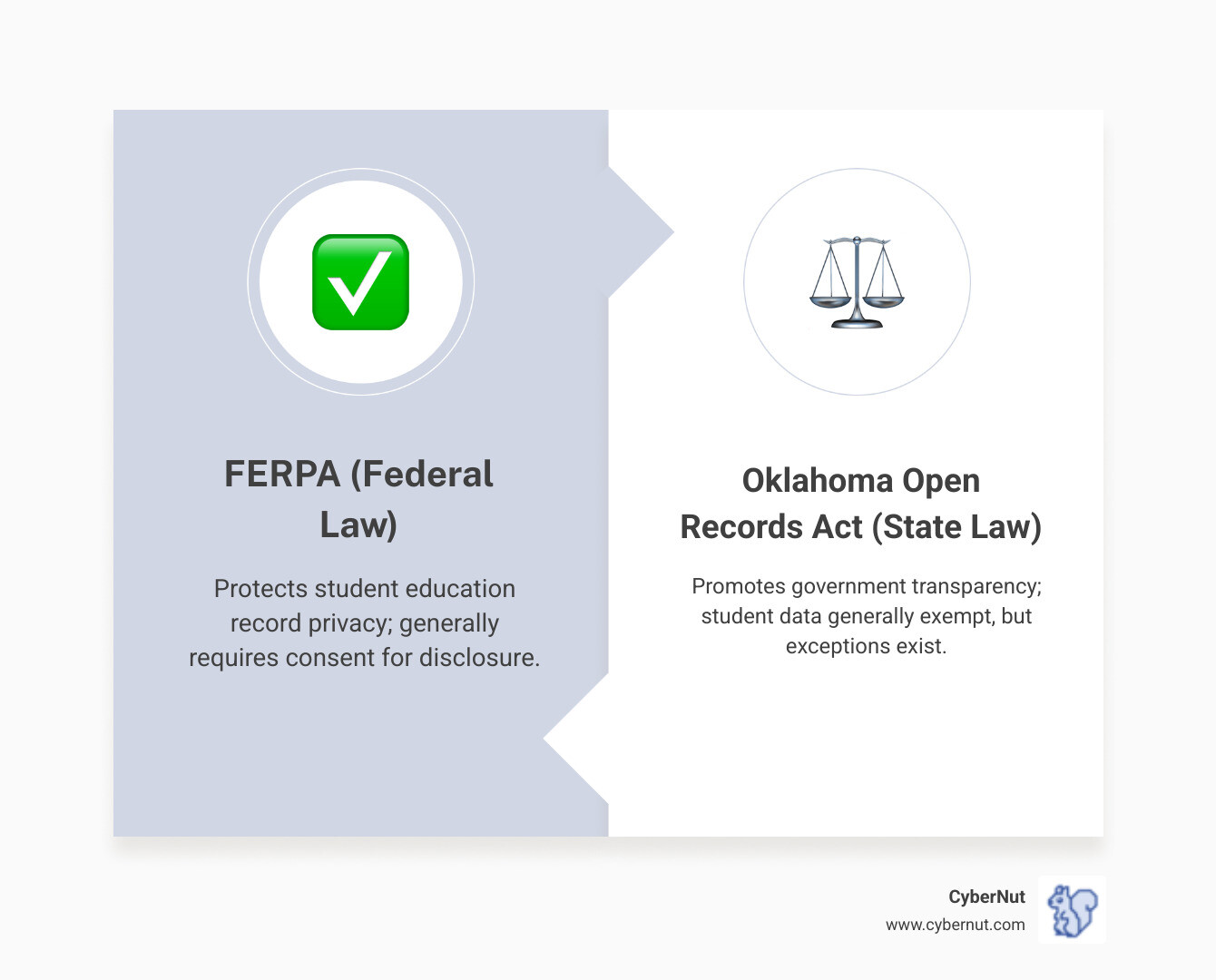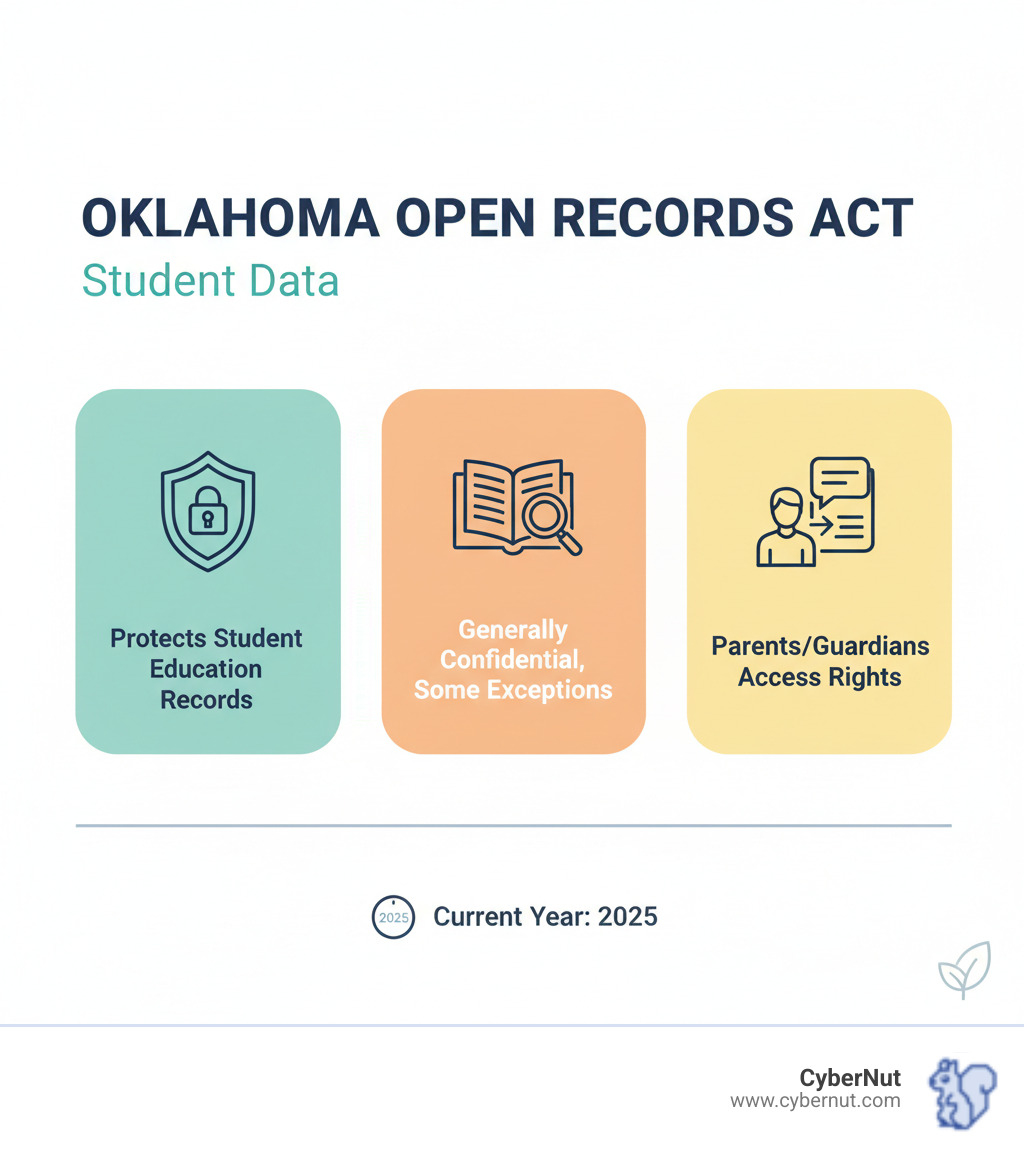
Oliver Page
Case study
October 27, 2025

The Oklahoma Open Records Act (as it applies to student data) balances public transparency with student privacy. While state law guarantees access to government records, federal and state privacy laws strictly protect sensitive student information from disclosure.
Here's what school administrators need to know:
For IT directors and administrators in Oklahoma, understanding this legal intersection is about protecting students while meeting transparency requirements. Schools are a prime target for data breaches, as they collect sensitive information like social security numbers, addresses, grades, and disciplinary records. When public records requests arrive, you must know what can be shared and what must be protected.
The Oklahoma State Department of Education doesn't maintain individual student records—your district does. However, the Open Records Act applies to both state and local agencies, with student privacy laws creating significant exemptions.
Non-compliance with FERPA can mean loss of federal funding, while improper data disclosure can lead to legal action and harm students. This guide breaks down how these laws work together, what data you can and cannot release, and how to handle open records requests while keeping students safe.

Key terms for Oklahoma Open Records Act (as it applies to student data):
The Oklahoma Open Records Act (51 O.S. § 24A. et seq.) is the foundation of public transparency in education. It guarantees that citizens can access records from governmental bodies, including the Oklahoma State Department of Education (OSDE), local school districts, and public universities.
This commitment to transparency, however, must coexist with the critical need to protect student privacy. The Oklahoma Open Records Act (as it applies to student data) is therefore shaped by federal and state privacy laws that create significant exemptions for sensitive student information.
If you're requesting records from the OSDE, their Open Records Act Requests | Oklahoma State Department of Education page outlines the process.
The law broadly defines a "record" as any documentation created or maintained by a public body, regardless of format. This includes datasets, emails, meeting minutes, financial documents, and administrative policies. The OSDE processes these requests under rule 210:1-3-11 and posts many commonly requested records on its Public Records website.
Before filing a formal request, check that website for readily available information like enrollment statistics, testing data, finance information, and school district salary data. For context on the state's broader data framework, see More on the Oklahoma Data Governance Act.
Many people are surprised to learn that the OSDE does not hold all educational records. Sending your request to the wrong agency causes delays. Knowing where records live saves time.

Directing your request to the correct agency from the start ensures a faster response, which is crucial when balancing transparency with information security.
The Oklahoma Open Records Act (as it applies to student data) does not operate in a vacuum. It is subordinate to the Family Educational Rights and Privacy Act (FERPA), a powerful federal law protecting student privacy since 1974.
FERPA is the ultimate guardian of student education records for any institution receiving federal funds, which includes nearly every public school in Oklahoma. The law is clear: you cannot disclose personally identifiable information (PII) from a student's education records without written consent from a parent or eligible student (18 or older).
This creates a legal hierarchy: when federal and state laws conflict, federal law prevails. If a record contains PII protected by FERPA, it remains confidential, even if it would otherwise be public under Oklahoma's Open Records Act. A single mistake could jeopardize federal funding for your district. For a full breakdown, see All About FERPA: The Federal Student Privacy Law That Still Matters in 2025 or the official Family Educational Rights and Privacy Act (FERPA) page.
FERPA allows an exception for "directory information"—basic details not generally considered harmful if shared. Schools can designate information like a student's name, address, phone number, major, class year, enrollment status, awards, and participation in activities as directory information.
However, parents and eligible students have the absolute right to opt out. If they notify the school in writing that they want this information withheld, it immediately becomes confidential. For example, Owasso School District requires parents to mail an opt-out request within 30 days of the first day of school. Always check your opt-out list before releasing any directory information. Additionally, federal law requires schools to provide military recruiters with student names, addresses, and phone numbers unless a parent or student has opted out in writing.
FERPA includes several important exceptions that allow disclosure of PII without prior consent to ensure schools can function effectively and keep students safe. These include disclosures to:
These exceptions are not loopholes but carefully defined provisions for necessary school operations. Understanding them is essential for compliance with both FERPA and the Oklahoma Open Records Act (as it applies to student data).
Beyond FERPA, Oklahoma has its own law to protect student information: the Student Data Accessibility, Transparency and Accountability Act of 2013 (70 O.S. § 3-168). This Act mandates how student data is collected, managed, and secured in Oklahoma's K-12 system.

This law places clear responsibilities on the State Board and Department of Education to create and maintain documented security plans. It works with the Oklahoma Open Records Act (as it applies to student data) to balance transparency and privacy. For details, review the legal text or our guide, More on the Oklahoma Student Data Accessibility, Transparency, and Accountability Act 2013.
The 2013 Act precisely defines what is and is not "student data." This is crucial for determining what information is protected.
Student data includes any data collected at the individual student level and included in an educational record. This covers assessment results, grades, transcripts, demographic data, discipline reports, and student testing numbers. The State Board of Education must maintain a public data inventory and dictionary of all data elements collected.
Notably, the law explicitly excludes juvenile delinquency, criminal, medical, and Social Security records from the definition of student data unless they are already part of an educational record. The Act also distinguishes between aggregate data (group-level information that cannot identify individuals) and de-identified data (information stripped of all PII).
This Act actively restricts the Oklahoma Open Records Act (as it applies to student data) where individual student information is concerned. The State Department of Education must use only aggregate data in public reports or when responding to Open Records requests. This ensures public transparency on school performance without exposing individual student records.
Access to individual student and de-identified data is tightly controlled. It is limited to authorized state and district staff, students and parents viewing their own records, and authorized staff at other state agencies as required by law. No one else is granted access.
The Act also governs out-of-state data transfers and requires that contracts with private vendors include express provisions for data privacy and security. Finally, it mandates detailed data security plans that include procedures for breach planning and notification, ensuring a prepared response if data is compromised.
This layered approach—federal FERPA, state accountability, and a carefully limited Open Records Act—creates a robust shield for student information.
Knowing the correct process for accessing public records from an Oklahoma educational institution can save significant time. The Oklahoma Open Records Act (as it applies to student data) provides specific pathways, but procedures vary between the State Department of Education (OSDE) and local school districts.

Following the proper channels and being specific about your needs will help ensure a smooth process. It's also important to understand the potential fees, timelines, and limitations involved.
Be specific about what you're requesting. Vague requests like "all emails about student testing" can cause delays or denials due to "excessive disruption." Instead, specify date ranges, individuals, programs, or document types. Before submitting, double-check that you're asking the right agency. As noted earlier, transcripts, GED records, and college records are held by other entities.
After submitting, you'll receive a confirmation email with a tracking number to check your request's status. For local school districts, check their websites for specific policies and forms. Before filing any request, browse the OSDE's Public Records website, as the data you need may already be available.
Many simple requests are fulfilled with minimal or no fees. However, complex requests can incur costs for searching, retrieving, and copying records.
Payment is typically required upfront. Most requests are fulfilled within a 30-day guideline, but complex requests may take longer. The law allows delays to prevent excessive disruption to operations.
Your request may be denied or heavily redacted for several reasons. The most common is that individual student information is confidential under FERPA and state law. Other records may be withheld if they are exempt by law, protected by attorney-client privilege, or would constitute a clearly unwarranted invasion of personal privacy. Certain personnel records and personal notes of staff may also be confidential. Finally, a request that is overly broad or burdensome can be denied or you may be asked to narrow its scope.
Beyond public access, FERPA guarantees parents and eligible students (18 or older) the right to access and review their own educational records. This ensures you can see, review, and challenge the information your school maintains. Oklahoma institutions like the University of Oklahoma and Owasso School District have clear procedures to honor these rights, which are a key part of any Data Security and Privacy Plan.
If there's an error in your child's file, an incorrect grade or a misplaced disciplinary note, you need a way to find and fix it. These rights are designed for that purpose.
The process for accessing and amending records is straightforward.
To inspect records, submit a written request to the appropriate records custodian, such as the school principal or university registrar. The institution has up to 45 calendar days to provide access. They must allow you to inspect the records and may provide copies, sometimes for a small fee. If records contain information about other students, that information must be redacted.
To request an amendment, submit another written request explaining what you believe is inaccurate or misleading and why. The institution will review it and decide whether to amend the record. If they refuse, you are entitled to a formal hearing to challenge the decision. Even if the hearing is unsuccessful, you have the right to place a statement in the record explaining your disagreement. This statement must be disclosed whenever the record is shared.
Your rights only matter if the records are secure. Oklahoma's Student Data Accountability Act (70 O.S. § 3-168) mandates a detailed data security plan for the State Department of Education. This plan must include:
The OSDE collaborates with OMES Cyber Command to safeguard the state's data and infrastructure. For school districts, implementing these measures is about protecting students. As we discuss in Cybersecurity is Now Disaster Preparedness: A New Playbook for K-12 Leaders, a strong cybersecurity posture is essential. If your staff isn't trained to recognize phishing attempts, technical safeguards alone are not enough. Understanding your vulnerabilities is the first step to securing your district.
Navigating the Oklahoma Open Records Act (as it applies to student data) is about balancing public transparency with the critical duty to protect students. Federal FERPA protections, reinforced by Oklahoma's Student Data Accountability Act, create a strong defense for sensitive information while the Open Records Act ensures government accountability.
For school administrators and IT directors, this requires robust systems for managing data, clear policies for staff, and technical safeguards to prevent breaches. You must know when to release directory information and when a request must be denied to protect student privacy.
The stakes are high, with risks including loss of funding, legal action, and harm to students. Walking this line requires knowledge and a commitment to building a security culture in your district.
At CyberNut, we know that trained staff are your best defense. When your team understands why data security matters and can spot threats like phishing, your entire district becomes more resilient.
Ready to strengthen your district's defenses? Start by understanding your vulnerabilities. Get a free phishing audit to see where your team stands. Then, explore more cybersecurity resources for schools to build the comprehensive security culture your students deserve.
This is about keeping kids safe in a digital world. Every piece of data you protect and every staff member you train helps create a safer educational environment.

Oliver Page

Some more Insigths


Back